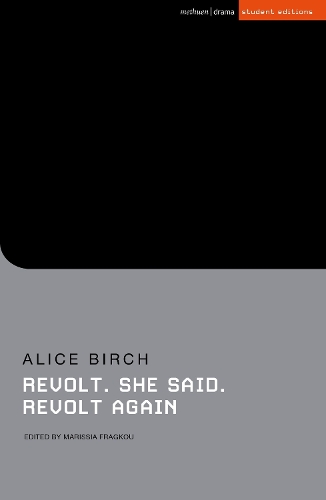
Revolt. She said. Revolt again
(Paperback)
Available Formats
Publishing Details
Revolt. She said. Revolt again
By (Author) Alice Birch
Volume editor Dr Marissia Fragkou
Bloomsbury Publishing PLC
Methuen Drama
22nd February 2024
United Kingdom
Classifications
Tertiary Education
Non Fiction
Modern and contemporary plays / drama
Gender studies: women and girls
Social discrimination and social justice
822.92
Physical Properties
Paperback
96
Width 130mm, Height 196mm, Spine 8mm
89g
Description
Through a series of arresting vignettes and a collection of nameless characters, Alice Birch examines the language, behaviour and forces that shape women in the 21st century. The play asks what's stopping us from doing something truly radical to change them Written in response to the provocation that well-behaved women seldom make history, the play is an assault on the language that has fueled violence against women throughout history. Problematic language frequently attached to women is interrogated, from lazy sexist clichs to the conventions around a marriage proposal. Through doing so, the play rails against the conventions of work, sex, motherhood, aging and love. Revolt. She said. Revolt again was first performed at the 2014 Midsummer Mischief Festival in Stratford-upon-Avon. It transferred to the Royal Court Upstairs and was more recently produced at New York's Soho Rep. It is published here in a Student Edition alongside commentary and notes by Marissia Fragkou, who locates the play in our contemporary political and cultural context (including second- and third-wave feminism, and the #MeToo movement).
Reviews
Alice Birch doesnt want this work to be unseen. Her angry and frantic play Revolt. She aaid. Revolt again is an experimental work focused on using a feminist voice which is loud; a feminist voice which seeks to change the world not through small increments but through a revolution: through the destruction of language; through the destruction of society... * Guardian *
Ms. Birchs play, which became a hit for the Royal Shakespeare Company in 2014, has a way of making you question everything you say when it comes to discussing women and their relationships with men, one another and a world in a state of unending upheaval... Linguistic confusion plagues the frantic souls portrayed... Even the plays title, with its use of periods instead of commas, suggests the difficulty of getting words out and how inadequate they seem when you do... Yet Revolt teems with the same anarchic fury that possessed Jimmy Porter [in Look Back in Anger] and the same frustrated awareness that there are no easy fixes for an unsatisfactory social system... Instead, Ms. Birch is articulating the alternatives that come to womens minds in dealing with how they are dealt with as objects of love and lust, as employees and employers, as mothers and daughters. * New York Times *
Acts One to Three are dialogues. Issues of gender language change into material questions of marriage, of women in capitalism, women raped and colonised, women desperate for refusal of the roles imposed on them. By Act Four, everything is deconstructed and there isnt dialogue anymore... We witness conversations, haunting solo performances, disturbing statements about or directed to women, and a lack of genuine solutions provided in a system that benefits from oppression... In many ways, this play is a call to arms. It exposes the contradictions in simply refusing sexism in words, which is promoted as revolutionary by the very agents of the status quo. * Diva Mag *
Author Bio
Alice Birch has written for the Royal Court Theatre, BBC Radio 4, Old Vic, Comdie de Valence, Almeida Festival, Clean Break, Schaubhne and RSC. She has been on attachment to the National Theatre Studio, Royal Court Theatre, Paines Plough and Channel 4. Her play Many Moons was shortlisted for the Susan Smith Blackburn Award and she was winner of the George Devine Award for Most Promising New Playwright in 2014. Marissia Fragkou is Senior Lecturer in Performing Arts and joined Canterbury Christ Church University, UK. She has published and presented papers on contemporary British and European theatre and performance, as well as performance and cultural politics, ethics of responsibility and radical democratic politics.
